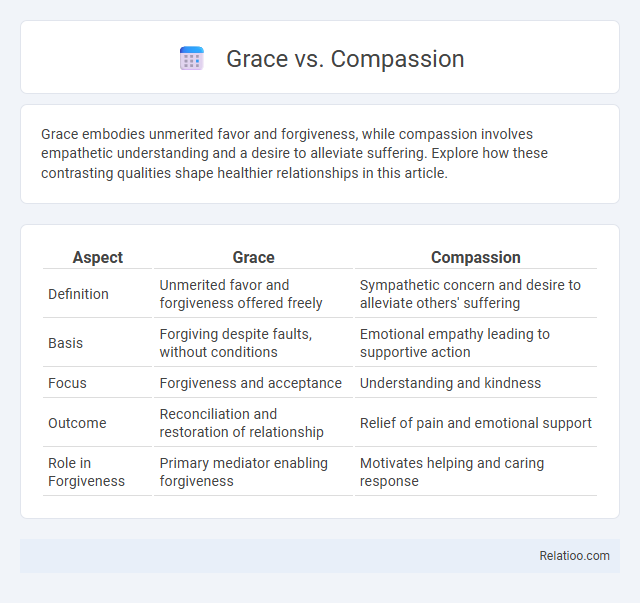Grace embodies unmerited favor and forgiveness, while compassion involves empathetic understanding and a desire to alleviate suffering. Explore how these contrasting qualities shape healthier relationships in this article.
Table of Comparison
| Aspect | Grace | Compassion |
|---|---|---|
| Definition | Unmerited favor and forgiveness offered freely | Sympathetic concern and desire to alleviate others' suffering |
| Basis | Forgiving despite faults, without conditions | Emotional empathy leading to supportive action |
| Focus | Forgiveness and acceptance | Understanding and kindness |
| Outcome | Reconciliation and restoration of relationship | Relief of pain and emotional support |
| Role in Forgiveness | Primary mediator enabling forgiveness | Motivates helping and caring response |
Understanding the Essence of Grace
Grace embodies unmerited favor and divine kindness that transcends human judgment, offering unconditional forgiveness and love. Compassion involves empathy and a deep awareness of another's suffering, prompting acts of kindness and support. Understanding the essence of grace requires recognizing its transformative power to heal and restore, encouraging Your own ability to extend mercy beyond mere sympathy or compassion.
Defining Compassion: Core Elements
Compassion involves recognizing the suffering of others and actively desiring to alleviate it through empathy, kindness, and support. Unlike grace, which is often seen as unearned favor or forgiveness, compassion requires emotional attunement and a proactive response to pain or hardship. Understanding these core elements helps you develop genuine compassion by fostering connection and purposeful care for those in need.
Historical Roots of Grace and Compassion
Grace originates from ancient theological traditions, particularly within Christianity, where it denotes unmerited divine favor and forgiveness. Compassion has deep roots in various spiritual and philosophical schools, including Buddhism and Stoicism, emphasizing empathy and the desire to alleviate others' suffering. Understanding these historical foundations enhances your ability to discern the profound differences and complementary nature of grace and compassion in modern ethical contexts.
Key Differences Between Grace and Compassion
Grace involves unearned favor and kindness extended without expectation of merit, often seen as a divine gift, while compassion is the empathetic response to another's suffering, motivating acts of care and support. Your understanding of grace emphasizes forgiveness and generosity regardless of circumstances, whereas compassion centers on shared emotional experience and active concern. Recognizing these distinctions helps you apply grace as unconditional benevolence and compassion as heartfelt empathy in interpersonal relationships.
The Role of Empathy in Compassion
Empathy plays a crucial role in compassion by enabling you to deeply understand and share the feelings of others, fostering genuine concern and kindness. While grace often refers to unmerited favor or elegance, compassion specifically requires empathetic connection to motivate supportive actions. Your ability to empathize transforms compassion from a passive feeling into meaningful help that alleviates others' suffering.
How Grace Manifests in Daily Life
Grace manifests in daily life as the ability to extend kindness and forgiveness even in difficult situations, showing unearned favor toward others. It often appears in patient listening, offering help without expecting anything in return, and maintaining composure under stress. Unlike compassion, which focuses on empathizing with others' suffering, grace embodies a purposeful choice to respond with generosity and moral strength regardless of circumstances.
Grace vs Compassion in Major Religions
Grace and compassion hold distinct yet complementary roles in major religions such as Christianity, Islam, and Buddhism. Grace is often understood as an unmerited divine favor or blessing bestowed by God, central to Christian theology where it signifies salvation and forgiveness beyond human efforts. Compassion, emphasized in Buddhism and Islam, involves empathetic action and kindness towards others, reflecting moral duty and spiritual development that You can cultivate in daily life.
Psychological Benefits of Practicing Grace and Compassion
Practicing grace and compassion fosters emotional resilience and enhances psychological well-being by reducing stress and promoting empathy. Grace involves forgiveness and acceptance without judgment, which helps release negative emotions and cultivates inner peace. Compassion encourages understanding and connection with others, leading to improved social relationships and a deeper sense of personal fulfillment for You.
Cultivating Grace and Compassion Within Yourself
Cultivating grace and compassion within yourself involves embracing both self-forgiveness and empathy toward others, fostering a balanced emotional state. Grace allows you to handle challenges with dignity and patience, while compassion deepens your understanding of others' struggles, creating a foundation for meaningful relationships. Integrating these qualities promotes inner peace and strengthens your ability to respond thoughtfully in difficult situations.
Real-Life Examples: Grace and Compassion in Action
Grace manifests in real life as forgiving a colleague who made a costly mistake without holding resentment, fostering a positive work environment. Compassion is evident when a neighbor organizes meal deliveries for a family facing illness, showing empathy and support. Both grace and compassion in action strengthen relationships by promoting understanding and kindness beyond mere obligations.

Infographic: Grace vs Compassion
 relatioo.com
relatioo.com